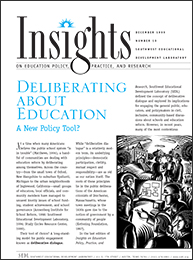The Calling the Roll Program
The “Calling the Roll” Program

Calling the Roll: Study Circles for Better Schools is a deliberative dialogue program on education that was implemented in Arkansas and Oklahoma in late 1998. Beginning in the fall of 1997, a collaborative partnership among six organizations initiated, planned, and learned from the program, with each partner assuming a role in one or more key areas of responsibility:
- Southwest Educational Development Laboratory—state policy research, partner communications, materials and product development.
- Study Circles Resource Center—materials development,
training and technical assistance, state and local coordination evaluation. - Arkansas Friends for Better Schools—Arkansas program coordination.
- Center for Research on Teaching and Learning (now Center for Applied Studies in Education), University of Arkansas at Little Rock—participant data analysis, local impact research.
- League of Women Voters of Oklahoma—Oklahoma program coordination.
- Department of Sociology, University of Oklahoma at Norman—research assistance.
The vision and implementation
The vision for the Calling the Roll program was to create an open, non-partisan opportunity for ordinary citizens and their state decision makers to engage in deliberative dialogue about education. The collaborative partnership developed a program design, based on the principles and strategies of the community-wide study circle process, which offers an inclusive, thoughtful format for small group discussion. The two coordinating organizations adapted this design for their respective states. Each also had a unique but complementary set of goals for sponsoring the program.
The goals of Arkansas Friends were:
- to increase public involvement in and support for schools,
- to enhance knowledge and understanding of public education, and
- to institutionalize study circles and encourage its use as a method for community problem solving.
The goals of the League of Women Voters were:
- to educate citizens about education;
- to help citizens feel more connected to their community, particularly to their school and other educational opportunities;
- to increase the direct involvement of public officials with constituents; and
- to strengthen communities by introducing deliberative democracy as a framework for solving problems.
In each of the 15 participating communities, volunteer participants met in small groups (typically 8-12 people each) over a 4- to 6-week period during fall 1998. Some met in schools or university buildings and others in churches or community centers. Assisted by a trained facilitator and written materials, they discussed:
- how schools have affected their lives and community,
- know and be able to do,
- how they view different approaches to ensuring the “best education possible” for the children and youth in their community, and
- what they can do to improve public schools.
Based on state coordinators’ estimates, over 500 citizens attended one or more study circle sessions in each of the two states during the implementation period.
Policy Research
The goal of SEDL’s policy research study of the Calling the Roll program was to learn whether deliberative dialogue can be a useful and feasible way for state policymakers to interact with constituents about education policy-relevant issues.
Designed in June of 1998 and continued beyond the 1999 Arkansas and Oklahoma legislative sessions, the research study had two major objectives:
1. To explore how state policymaker participation in study circles affects the education policymaking process.
2. To learn about the process of implementing a statewide program of study circles on education that includes state policymakers.
Twenty-four state policymakers participated in the Calling the Roll program and/or SEDL’s research activities associated with the program: eight state Senators, thirteen members of the House of Representatives, and three other state-level decision makers. Within the group, experience in state policy ranged from zero (newly elected) to sixteen years, with eight individuals also having professional experience as educators. Twenty legislators attended study circles in either a community they directly represent or a nearby school district.
SEDL used a combination of two complementary research approaches to address its research objectives: an impact study of program effects on state policymakers and a process evaluation of the implementation. The most significant data collection was a set of pre- and post-program interviews conducted with each legislator who attended a study circle. In addition, SEDL conducted a baseline and post-program survey of legislators and observed selected study circles.
Key findings from the research report, to be published in early 2000, will be summarized in an Insights on Education Policy, Practice, and Research.
Next Page: What Are the Benefits for a State Policymaker?

